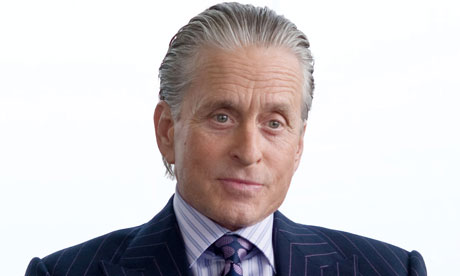
Hollywood's legendary semi-recovering dosh addict is back; Oliver Stone has chosen this moment to revive the memory of pop culture's most famous banker. Gordon Gekko, that slick-haired, braces-wearing shark who went to jail back in 1987 for insider trading, is out and back in the Big Apple as the market suffers its biggest collapse ever. Gordon may not have the suits, and he may have to suffer the unspeakable indignity of using the New York subway, but he's as charming and manipulative as ever, with a new plan to spend colossal amounts of other people's money.
Quite clearly, Stone and his screenwriters Allan Loeb and Stephen Schiff believe their film is cuttingly contemporary, ironic and biting: actually, it's even more naive and celebratory about the financial world with all its sexiness than the last film. The issues are fudged with creamy indulgence; and speculative trading, notionally reviled, is finally shown to be the means of getting vital funding for politically correct clean energy, and even of reuniting father and daughter. Gekko winds up as a lovable grandad: the biggest jungle beast is a sweet old pussy cat, and a rather boring one.
Michael Douglas, reprising the role that made his career, is still a warm and watchable presence: this actor has found new legions of admirers with the candour, courage and good humour with which he has discussed his treatment for throat cancer. The opening sequence, showing him getting out of the joint, contains the movie's one good joke – in fact, its single good moment. Ageing scoundrel Gekko is getting his personal effects returned to him in a variation of the first scene of The Blues Brothers. The deadpan guard recites the returned possessions: "One silk handkerchief … One gold money-clip without any money in it … One mobile phone…" – and Gekko is shown to be a Reagan-era zoo-dinosaur now implausibly released into the 21st-century wild. (It would be nice to see this classic out-of-jail scene repeated with another famous prisoner: "One can of fava beans (opened) … One bottle of Chianti (half-empty)…")
It turns out that Gekko has an estranged daughter, Winnie, played by Carey Mulligan with an elfin short haircut; she is a pale liberal-lefty blogger who, with a very cross face, asks for the TV to be turned off when her rascally old dad pops up promoting his new book. Winnie is going out with a handsome, idealistic young Wall Street trader called Jake Moore, played by Shia LaBeouf, who is trying to promote alternative-energy stocks. Gekko uses Jake as a means of getting back in touch with his daughter, and Jake falls under the Master's sinister spell.
The first movie had the unimprovable slogan: "Greed is good." This one has one that is far more cumbersome: "Money's the bitch that never sleeps – and she's jealous," a crass formulation that should tip you off that this is a very male film about money, Cohibas and motorbikes. Like the original, it is weighed down with father-son imagery: there's even a Freudian glimpse of Kirk Douglas's photo in one shot. In the first film, Gekko was the satanic, parodic "father" figure to Charlie Sheen. The passing of time has kicked Gordon up to grandfather level and now it's Jake as the "son" figure to a different surrogate dad: amiable, principled banker Louis Zabel, played by Frank Langella – he's supposed to be the good guy, driven to bankruptcy and desperation by the "bad" father figure, Bretton James, played by Josh Brolin, who has deliberately accelerated or even created the Wall Street meltdown to assist his own parasitical deals. Jake accepts a job with Bretton, and also the junior role in a creepy mentor-protege relationship, simply to get close enough for revenge.
Together, Brolin and LaBeouf have a fantastically embarrassing macho scene in which they metaphorically measure up the length and girth of their respective male members by challenging each other to a motorbike race. "On your best day, you'll never ride like me," sneers Jake. The resulting contest, on a secluded country road, is so pointless and boring it would be more convincing to see these beta-males race on unicycles or pogo-sticks.
There's just not enough of Gekko. And what there is comes with a new, lenient sentimentality and dullness. This long, long film is distended with ambient moodscape scenes of Manhattan between almost every scene, a whiny decaffeinated soundtrack from David Byrne, and some strange cameos. Stone unblushingly awards himself a walk-on and, incredibly, Vanity Fair editor Graydon Carter appears briefly in one restaurant scene, where Gordon is dining with Winnie and Jake. Slimy Gekko rushes up to greet him and Carter's sudden, pop-eyed expression is evidently intended to convey baffled disapproval. It looks as if Mulligan has invisibly snuck round and jammed her thumbnail into his bum. Sheen is back, too, as Bud Fox – and he's as rich as can be.
For all the lip-service paid to the idea of casino capitalism being so very awful, no one is shown actually becoming poor, or in any real way enduring the inconvenience of being permanently deprived of money. The one person who comes closest to this is Jake's mom (Susan Sarandon); hammered by the sub-prime collapse, she has to abandon her estate-agent job and go back to the purer but humbler job of nursing. It's not a moral wake-up call that any of the guys have to suffer. As to this sequel's sub-title: well, it may well be true that money never sleeps. But you will.

